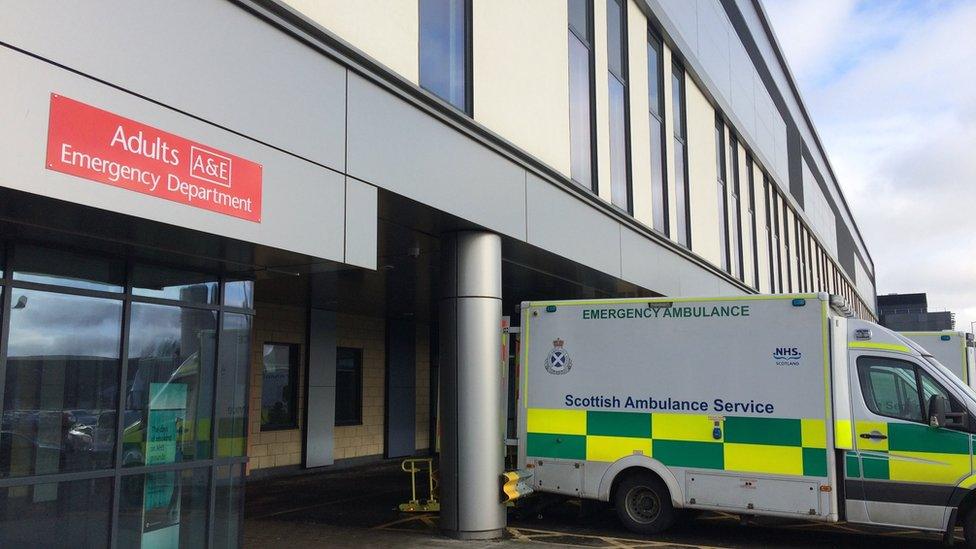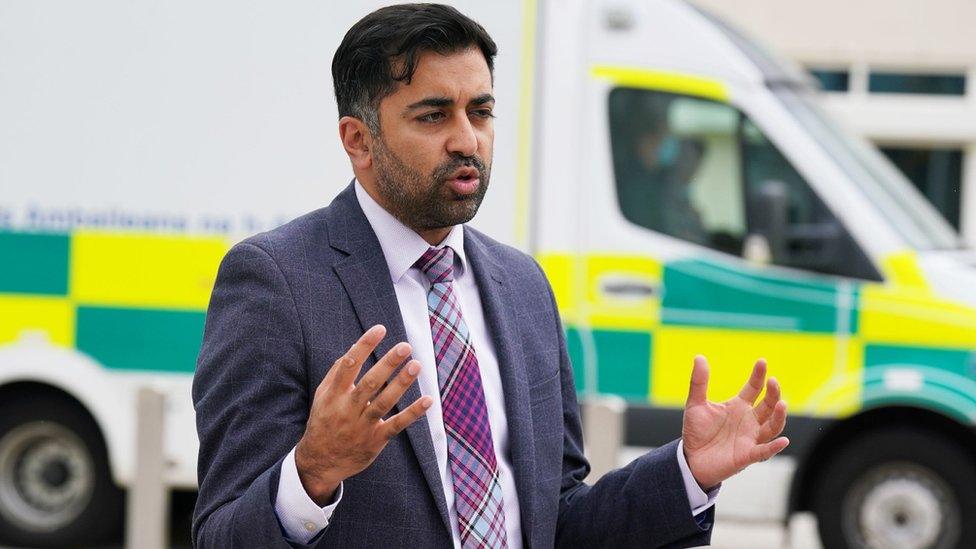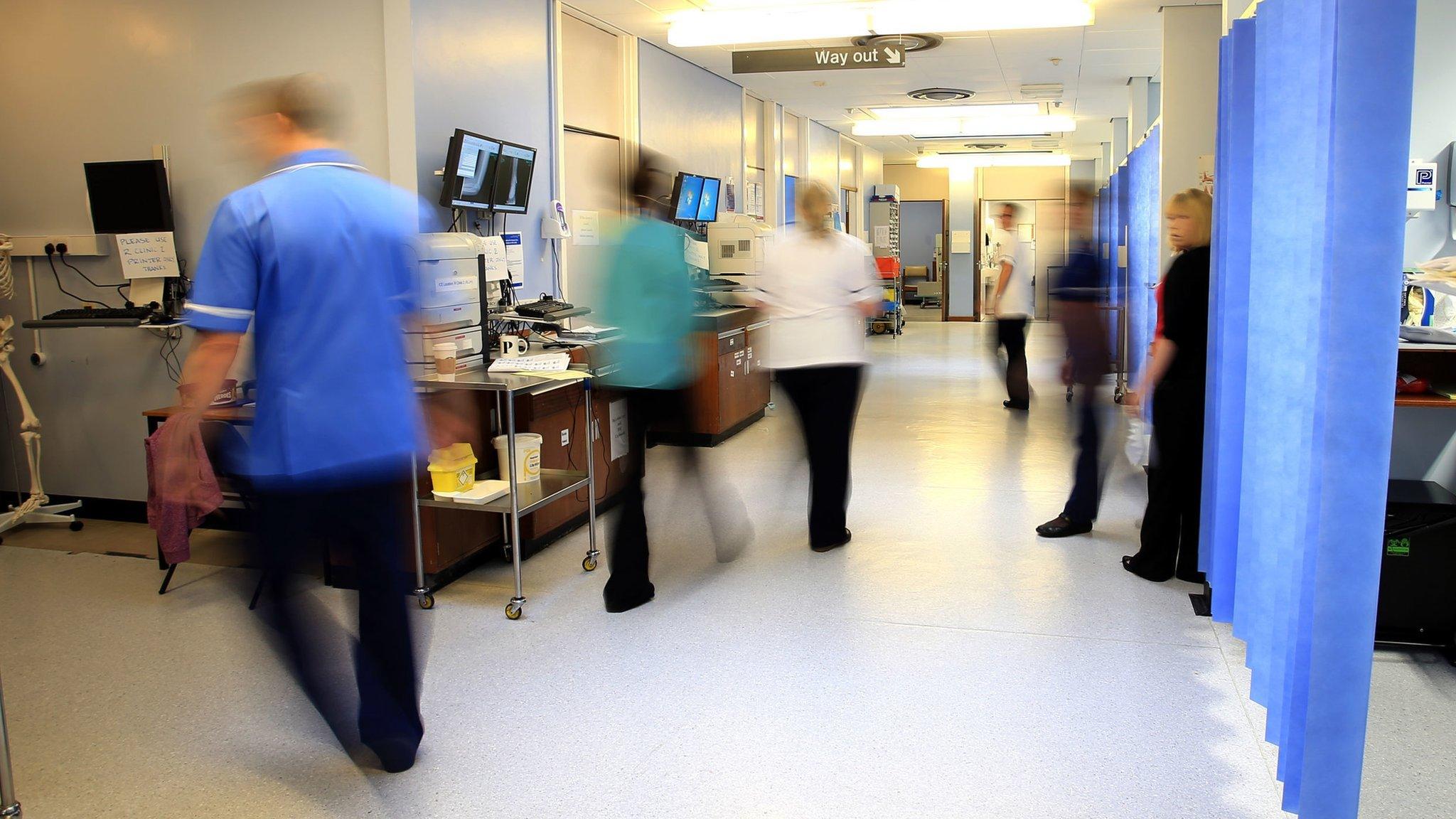Queen Elizabeth University Hospital records worst A&E waiting times
- Published

The QEUH recorded the worst A&E waiting times omn record
Glasgow's Queen Elizabeth University Hospital has recorded the worst A&E waiting time figures on record, with almost two-thirds of patients waiting more than four hours to be seen.
Across Scotland emergency department waiting times for the week ending 20 November were the second worst since the recording system began in 2015.
Just 63.1% of patients were dealt with in the four-hour target time.
Some 9,390 patients waited more than the four-hour to be attended to.
The latest Public Health Scotland stats, external show 3,013 patients spent more than eight hours in A&E while 1,062 waited more than 12 hours.
Performance varied across Scotland's hospitals with some, such as Western Isles and Lorn and Islands in Oban, meeting the Scottish government target which aims to admit, transfer or discharge 95% of patients within four hours.
Other larger hospitals such as Perth Royal Infirmary (92.9%) and Dundee Ninewells (89.5%) also performed well against the target.
But five managed to deal with fewer than half of their A&E patients within four hours, including Forth Valley Royal (47.8%), Aberdeen Royal (46.8%), Hairmyres in East Kilbride (43%), and the Royal Infirmary of Edinburgh (41.3%), Scotland busiest A&E department.

The QEUH in Glasgow, the second busiest A&E in Scotland, only managed to see 35.1% of patients within four hours, with 1,179 waiting longer than the target.
It was the worst performance by any hospital since weekly recording began seven years ago.
The previous lows were recorded by Forth Valley Royal in September and October this year.
A statement from the Greater Glasgow and Clyde health board said the hospital was facing significant pressures including challenges throughout the whole hospital which had an impact A&E.
It said a recruitment campaign was ongoing and was working on new ways to treat patients, including virtual A&E care.
It added: "Concurrently, we continue to urge any patient who thinks they need emergency care, but it's not life-threatening, to use alternatives to A&E such as local pharmacies, GPs, NHS Inform and the virtual A&E service, which is accessible through NHS24 on 111.
"These routes mean patients will be seen and treated faster than at A&E and helps ring-fence A&E for those with life-threatening injuries and illnesses."
'Grim picture'
Responding to the figures, Health Secretary Humza Yousaf said: "Covid continues to impact the performance of services and pandemic backlogs, Brexit-driven staff shortages, and inflation costs have all contributed to make this winter the most challenging the NHS has ever faced.
"Despite this, I am clear that A&E performance is not where it needs to be."
Mr Yousaf said delayed discharge continued to be the single biggest factor driving up A&E waits and he was working to ensure people were leaving hospital without delay, freeing up beds for those who need them.

Health Secretary Humza Yousaf said it was the most challenging winter the NHS had ever faced
Scottish Tory heath spokesman Sandesh Gulhane said: "These figures show our NHS is heading for a truly terrifying winter on Humza Yousaf's watch.
"More and more lives are being put on the line every single week in A&E under this health secretary. We are still yet to hit December, yet he's presided over yet another deplorable set of stats."
Dr Gulhane said the QEUH figures were "especially horrendous", adding that the data was "completely unacceptable and incredibly alarming for the safety of patients and staff at the hospital".
Scottish Labour Health spokeswoman Jackie Baillie said: "These figures paint a grim picture of the continual crisis that is facing patients and staff in A&Es across our country.
"Clearly, things aren't improving despite repeated promises from the SNP that they will get a handle on this chaos."
She added: "The abysmal figures reported from the QEUH show the intense pressure facing our hospitals, and things are only getting worse."
Related topics
- Published8 November 2022
